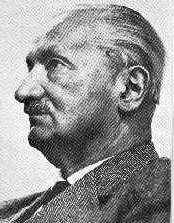

Heli Lanz
hlanz@earthlink.net
Martin Heidegger Page
jump to my analysis page
jump
to the Frankenstein Project
 |
 |
Born: 1889,
Died 1776.
Major Works
Basic Writings
Being and Time
Discourse on Thinking
Early Greek Thinking
The End of Philosophy
Hegel's Concept of Experience
Identity and Difference
On the way to Language
On Time and Being
Poetry, Language, Thought
What Is Called Thinking?
A very complicated question has been at the core of the human
condition; what are we here for, to what purpose does humanity report to? Martin
Heidegger, was in many ways fascinated with this question. He was born in Messkirch,
Germany and was educated in the study of philosophy. He also had formal instruction
on phenomenology from his professor, and well known Phenomenologist, Edmund
Husserl. In a publication entitled, Being and Time, Heidegger questions the
nature of man's existence on earth. David Richter, in an anthology entitled,
The Critical Tradition, states that, "Being and Time represents human beings
as isolated individuals thrown helplessly into worlds not of their own making,
who understand existence only through their interactions with the world they
inhabit." The term "Dasein" that is coined by Heidegger in this
book can be translated to mean "Being-in-the-World". And our being
in the world helps creates a need for us to thirst for what he terms "Sein"
or "true-being". This may be associated in some degree to romantic
notion of the "sublime". However, unlike the Keatsian mode of thought
that allows for an achievement of the sublime through an invocation of nature,
Heidegger would posit that this higher level of being cannot be achieved by
man. He was instead, concerned with the achievement of what he deems, "eigentlich"
or realization of an authentic existence. This would differ in a large degree
from the normal ideology of Existentialism.
In his movement from an assumption that the sublime, or some higher state of
being is possible, to a removal of that state from the scope of human conception,
Heidegger opens the door to a new type of thought. Under these precepts the
structures of society and the functions of technology within that structure
can be used as a means of exposing a more meaningful interpretation of just
how man fits in to riddle of nature and existence.